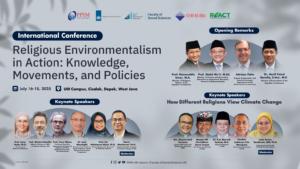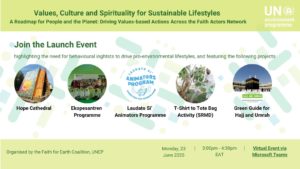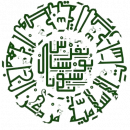PAS: How does the Qur’an define the environment and how does it describe what constitute environmental protection and are there parallels with Catholicism or other faiths that you wish to share?
İÖ: In fact, when we look at the first chapters and the verses of the Qur’an, which were revealed in the Meccan period, we see that its main purpose was “to awaken in man the higher consciousness of his manifold relations with God and universe.” Thus, by awaking in man a higher and deeper consciousness, firstly it changes his overall world view, then it constructs his image of himself; and consequently, his attitudes, feelings, sentiments, and the patterns of his relationships with reality begin to change accordingly. All these should be considered as a result of Qur’anic Weltanschauung.
The Qur’an, thus, with its emphasis on the metaphysical dimension of nature, replaced the pagan Arabs’ conception of nature with a new and vivid concept. Today, the Qur’an once more is ready to challenge the modern materialistic conception of nature, which is also dominant in Muslim societies through educational curriculum, and to suggest and provide a more comprehensive and holistic approach to developing an environmental ethical theory.
It is my firm conviction that once the metaphysical foundation for an environmental ethic is discovered within the Qur’anic value system, it will not be difficult to develop an environmental ethic on this basis. Furthermore, understanding the metaphysical dimension of the Qur’anic message will give us the opportunity of understanding and appreciating the development of sensitive ideas and attitudes concerning environment in the course of Islamic history, the first example of this, I think, is the behaviour and attitude of the Prophet to the environment.
The Prophet Muhammad, for example, both in his practices and in many of his Hadiths, attached great importance to planting trees, protecting existing ones, planting forests, as well as conserving them. A’isha, one of his wives, said: “His character was the Qur’an.” His practices and conduct related to conservation of the environment should therefore be considered from the Qur’anic standpoint. (Özdemir, 2003). For us, his actions are sources of inspiration constituting his Sunna or practices, which we are obliged to follow. To put it another way, as in all matters, the exemplar of Islamic conduct related to the environment and the person who displayed it in the most perfect fashion was God’s Messenger.
I attended many meetings on the subject but the most important one was the Abrahamic Traditions and Environmental Change Workshop, Rhodes, Greece, 23-26 June 2019, sponsored by the Abrahamic Programs for Academic Collaboration in the MENA Region. Using eight common principles identified in prior research on the environmental views of the world religions, we volunteered to indicate the extent to which our traditions -Judaic, Christian, or Islamic- agree with each principle and to provide a citation to a valued source that supports the principle. (Abrahamic Principles, 2019).
The outcome of this compilation provides concise theological grounding for motivating members of their respective communities in the Middle East and North Africa (MENA) to address ongoing problems of water availability, biological diversity loss, ecosystem degradation, and human-induced climate change. We decided to inform and urge our communities to return to the sources of their traditions and to reflect on them for meaningful motivation for their actions, including their efforts to collaborate with one another in addressing shared concerns.
PAS: Why and how do faiths matter when it comes to taking care of our environment?
İÖ: The role of religion to shape society and nature is evident everywhere. Although, the enlightenment project, materialistic and positivistic philosophical currents had tried to undermine the role of religion in modern society and human life, religion is still with us. Peter Berger, who declared himself a humanistic sociologist throughout much of his career, confessed that what he and “most other sociologists of religion wrote in the 1960s about secularization was a mistake”. (Berger, 1997)
Berger underlines in his seminal book The Sacred Canopy that “every human society is an enterprise of world-building” and “religion occupies a distinctive place in this enterprise” (Berger, 1967).
Therefore, “religions might be influential enough to help shift whole societies in more environmentally benign and sustainable directions”. (ibid). Providing people with a sense of meaning and purpose is arguably one of the most powerful but least appreciated assets of religion. A sense of purpose can unify entire societies around national goals. Ritual communication has a special place in the movement to create sustainable societies because it has long had the effect of protecting the natural environment.
In short, there is “the urgent need to promote a flourishing, sustainable future, the world’s religious communities have much to offer because the attitudes and beliefs that shape most people’s concept of nature are greatly influenced by their religious worldviews and ethical practices”. (Tucker, 2013)
Moreover, “the moral imperatives and value systems of religions have the potential to mobilize the sensibilities of people toward the goals of Earth Stewardship, here defined as shaping the trajectories of social-ecological change to enhance ecosystem resilience and human well-being”. (ibid)






